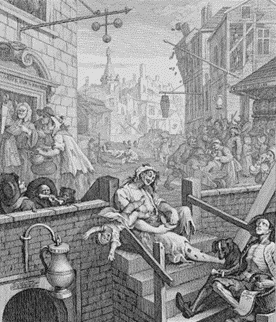Great Britain in the late seventeenth century had a bit of a problem. While the whole Industrial Revolution thing had made it one of the most powerful nations in the world, it had also caused rapid urbanization, drawing thousands of people into cities that were basically shit covered freshly shaken bags of cats. It should come as no surprise that crime was a bit of a problem. Now for a long time this issue was solved by just hanging anyone who broke pretty much any law you can think of. Kill a guy. Hanging. Make your living as a substantially more selfish Robin Hood. Hanging. Steal a gentleman's handkerchief. Hanging. Put graffiti on the bridge. Hanging. Say something disparaging about the king while taking a dump in the middle of the road. Most definitely a hanging. About the only way a person could avoid getting hanged, other than not doing crimes, was if the crime was rather minor, it was their first offense, and they could prove they could read. In these cases, people instead got a thorough whipping and their thumbs branded. Now I know this probably all sounds pretty terrible, but it’s probably worth keeping in mind that this state of affairs was actually more humane than the old methods, which mostly involved cutting off heads and beating people to death.
Regardless, as the crime rate spiked so did the number of hangings, and in the end it turned out that there are only so many hangings a normal person can go to before they begin questioning the whole effectiveness of it as a method to deter crime. Eventually, people became so disconcerted with the whole policy that Britain's ruling class decided that it would probably be a good idea to find some alternatives. After much debate, several tea parties, and an acceptable amount of good natured harrumphing, it was decided to start sending convicts to the British colonies in the Americas. For the British government this was a perfect solution. Not only were the colonies thousands of miles away, making it totally not their problem, but the colonies also needed more people to help cement the British claim of ownership.
Of course, not everybody was super happy with this new arrangement. For instance, the colonists already living there were less than pleased. These colonists were mostly a strange mix of businessmen, malcontents, and religious fundamentalists, who did not really think highly of the idea of adding convicts into the mix. Some of the colonies even tried to outlaw the transportation of convicts to their shores, though the British just kind of chuckled to themselves and kept doing it anyways. Some members of the clergy were also against the transportation of convicts, mostly because they saw the use of indentured servitude as pretty much white slavery, not to be confused with black slavery, which most of them were super a-okay with. However, given that the only other option at the time seemed to be hanging people again, most clergy members eventually managed to find some religious loophole to better put God's grace on the whole thing.
The whole transportation of convicts to the America's lasted for around 80 years, during which time approximately 120,000 people got shipped over. However, the whole system came crashing down when thirteen of the largest colonies rose up in rebellion in 1776. Deciding that it was probably not the best idea to send convicts to a place where people were actively killing British soldiers, the practice was halted. Unfortunately, by this time the British had pretty well lost their appetite for hanging anybody and everybody, leaving them with a quickly growing prison population with nowhere to go. Having few other options, at least to the popular thinking of the day, the British started storing these prisoners in old ships anchored out in the harbor, which is every bit as terrible as you can imagine. This went on for about ten years before the British remembered that they had also recently claimed another whole continent named Australia, which being even farther away and completely devoid of colonists, though not people, was an even better place than the Americas to send their unwanted.
Over the next eighty years the British sent some 162,000 convicts to Australia. They became the basis of the original Australian colonies, which over time became prosperous enough to attract non-convicts as well. Eventually the practice fell out of favor as the idea of just shipping your problems away gave way to actually trying to change criminals via imprisonment and rehabilitation. The last group of prisoners was transported to Australia in 1868. Britain didn't stop hanging people until 1964; though to be fair, the last hanging occurred in the U.S. in 1996, and it still remains a valid form of execution in most states. So you know, try not to be too judgy.
Image: https://en.wikipedia.org/wiki/Beer_Street_and_Gin_Lane#/media/File:Beer-street-and-Gin-lane.jpg
